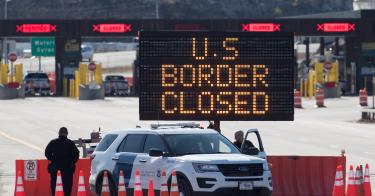The U.S. government on March 20 finalized agreements with our neighbors to the north and south to put into place the toughest travel restrictions we’ve ever had on our shared borders.
That was done while acknowledging that Canada, Mexico, and the U.S. are all each other’s critical trade partners and that hindering the massive amount of commerce between us is the last thing any rational person wants.
These are the times in which we live, and that’s the right move.
Obviously, all of this has happened in response the worldwide COVID-19 coronavirus pandemic that is savaging North America and the rest of the world. Travel restrictions have gone up everywhere, and now America and its two most closely tied neighbors are all in as well.
The agreements (“Joint Statement on U.S.-Canada Joint Initiative: Temporary Restrictions of Travelers Crossing the U.S.-Canada Land Border for Non-Essential Purposes” and “Joint Statement on U.S.-Mexico Joint Initiative to Combat the COVID-19 Pandemic”) are both 30-day special provisions that will severely restrict tourism and recreational traffic, but will leave essential commerce and essential trade/travel unaffected.
What does that mean?
Frankly, the hundreds of thousands of citizens of the three nations who cross back and forth between our benign mutual borders to shop, to vacation, to visit friends and family, and to do business of convenience will be massively inconvenienced. Their trips will be put on a 30-day (at least) hold, maybe longer.
All other travel will be allowed to continue, but one expects it will go more slowly as people are checked (in both directions) for signs of the virus.
Make no mistake: This is not a unilateral policy on the part of any of the three giant partners. All three national governments are in complete agreement that this needs to be done.
The spread of COVID-19 must be controlled, and lowering the possibility of contact is the only meaningful method now at our disposal. At the same time, the national leaders must minimize the damage (already huge) that all the virus-mitigation policies are doing to our respective economies.
These two complementary, bilateral agreements are a good shot at achieving that balance.
There will be three camps in the face of the two joint initiatives. The majority, in the middle, will understand and hope for the best. But at one end of the spectrum, some critics will claim that it’s a gross overreaction and that it will kill our respective economies. The other end will demand that the two borders (about 2,500 miles and nearly 5,000 miles) be shut down and “sealed.”
The middle ground is the right way to go.
There will undoubtedly be some tweaking over the next few weeks to get the execution of the initiatives to reach their maximum effectiveness, but we are on the right path.
The governments of Canada, Mexico, and the U.S. should be acknowledged for having tried to “thread the needle” on protecting our respective citizens without throttling our commingled economies. Getting it right is essential.
This piece originally appeared in The Daily Signal




